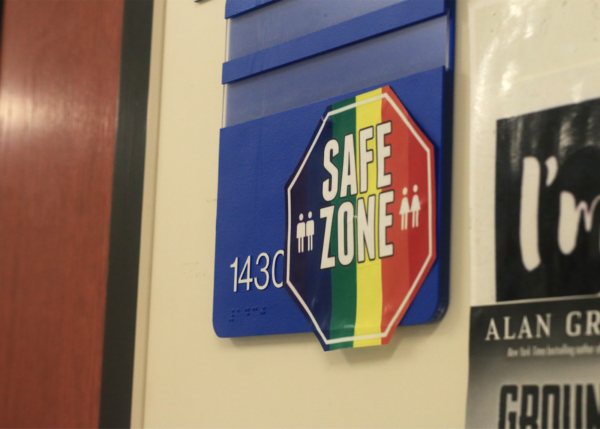Black Veil Brides comes back with heart-wrenching album
After a three-year break from the music industry, Black Veil Brides has come back with their fifth studio album, Vale. This album continues the story of “The Wild Ones,” which began being told in their third album, Wretched and Divine. It has been speculated that this will be their final album together, since the word vale means “goodbye” in Latin. There are also songs alluding to their departure from the music industry, such as “The Last One” and “Vale (This Is Where It Ends).”
The album starts with “Incipiens Ad Finem,” an introduction to the album. Like in Wretched and Divine, frontman Andy Biersack speaks during the introduction, taking on his character in “The Wild Ones” as “The Prophet.” He explains how their war against F.E.A.R. (For Every and All Religion) will be described in the later tracks. Following the introduction, “The Last One” begins with piano and light guitar strumming. The song quickly picks up pace and vocals come soon after. In this song, Biersack describes how in their war against society, this will be the last time “The Wild Ones” will fight for their freedom of mind in the dystopian world previously created by Black Veil Brides in Wretched and Divine.
“Wake Up” and “When They Call My Name” are tracks two and three on the album, but have striking differences. “Wake Up” explains how, regardless of who you are, you need to get up and make a change to the world. It’s very loud, guitar-heavy and raw. The chorus is more of a chant, but a catchy one. “When They Call My Name” is a nice change from the previous song. It’s slow and melodic, with really delicate vocals. Biersack hits higher notes in this song than in any of their other songs, and I think it’s a good contrast from his heavy screaming in Black Veil Brides’ other albums.
The next song, “The Outsider,” is the first single off the album, which was released in late 2016. Following the theme of freedom of opinion, Biersack sings about the struggles of being forced into a religion you don’t believe in, only to end up feeling like an outsider. This song is important to me because it has been around the longest and I find great meaning in it. The guitar solo in this song is beautifully done by Jake Pitts, the band’s guitarist. The riff is different than what the band has ever played before, and it flows nicely.
Next on the album is “Dead Man Walking (Overture II),” a song that Biersack described as their magnum opus, or their most important work. This track is eight minutes long and goes through many rhythm changes. The first half is more upbeat but high-pitched, with more of an optimistic vibe. The second half utilizes more guitar and drums, followed with deeper, darker vocals. Biersack described this as a song portraying what it’s like to fight for something even when you feel like none of your efforts are working.
“Our Destiny” was originally meant to be a song for Biersack’s solo record, but instead became my favorite track off of Vale. This song is by far the catchiest song off the album, but has a slight melancholic undertone. Following the story of the album, these lyrics explain the journey of “The Wild Ones” and how they are beginning to drift apart and fail at their goal of destroying F.E.A.R. Even so, this song is open to interpretation as it was not a song originally written from the perspective of “The Wild Ones.” I have begun to take it as a song that asks who will take you where you want to be in life, if destiny really does exist, or if it’s all just the choices we make in life leading us somewhere completely different.
“The King Of Pain” starts slow, with a fairly repetitive verse and consistent beats. The chorus, however, picks up pace with louder drums and guitars mixed with a more emotional tone in Biersack’s voice. The next track, “My Vow,” completely contrasts with the following song, “Ballad Of The Lonely Hearts.” “My Vow” is loud, upbeat and aggressive. The vocals are raspy and powerful, guitars are heavily utilized and drums are heard throughout. On the other hand, “Ballad Of The Lonely Hearts” starts with a piano before slowly picking up guitar strums. The vocals are loud but melodic and clear. The lyrics make this song a sort of tribute to people who think differently than the society in the dystopian world they’ve created.
The second to last song off of Vale is “Throw The First Stone,” which features really hard guitars, something I wanted more of in this album. This song sounds much more like a song off their self-titled album, Black Veil Brides. “Vale (This Is Where It Ends)” is the last song off this album. The guitarist, Jinxx, starts with soft violin playing, and Biersack follows soon after with some of the most delicate vocals I’ve heard from him. This track is reminiscent of “Done For You” off Wretched and Divine, which used to be one of my favorite songs. The lyrics in this song make me cry almost every time because they describe the end of “The Wild Ones” journey, a journey which I’ve followed for over five years.
Of all the albums I’ve waited for, this one has been the most worth it. I’ve waited four years for 11 songs, all of which I love. This album may not have been as lengthy or life-changing as Wretched and Divine, but it was certainly one I’ll be listening to for a very long time.

Sophomore Kellie Casburn is a reporter and this is her first year on staff. She enjoys writing, drawing, heavy metal, and watching Supernatural. [email protected]









